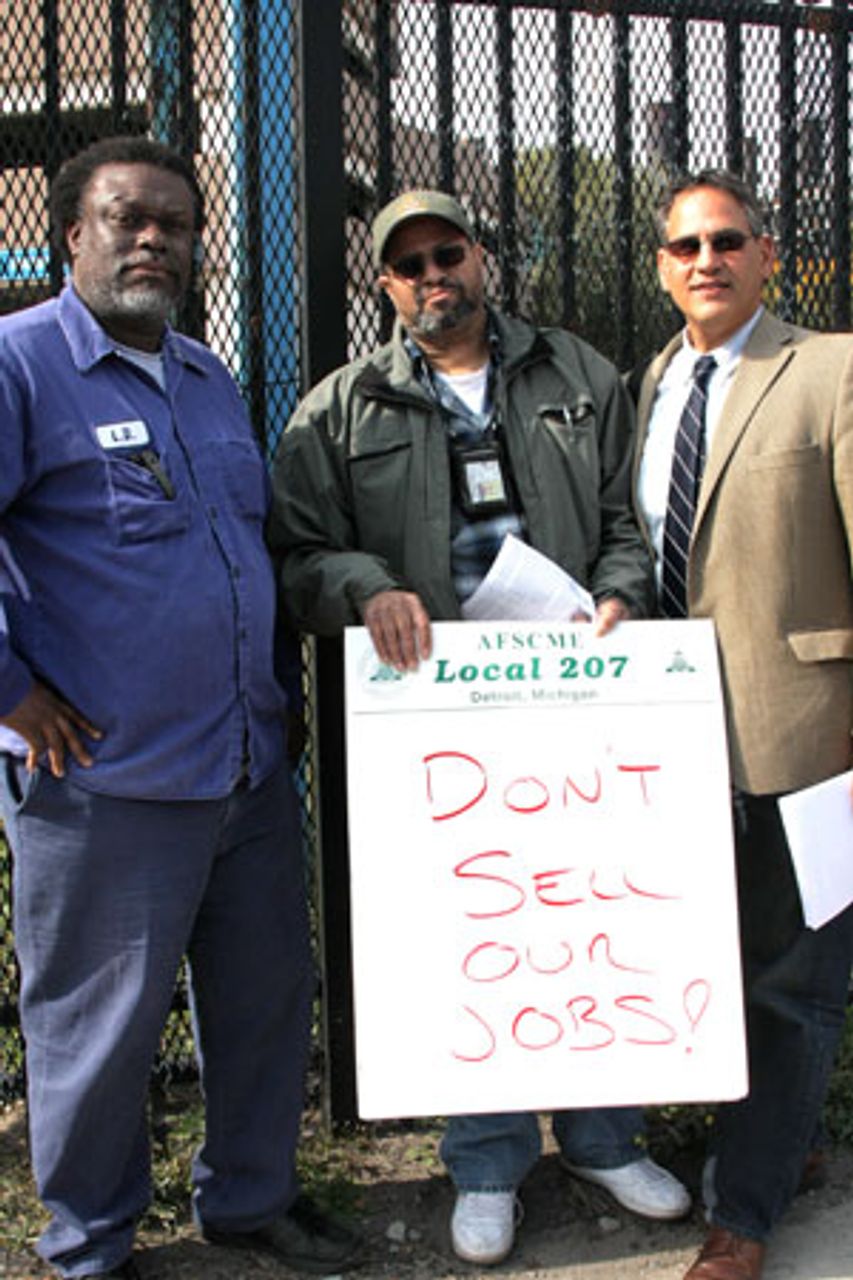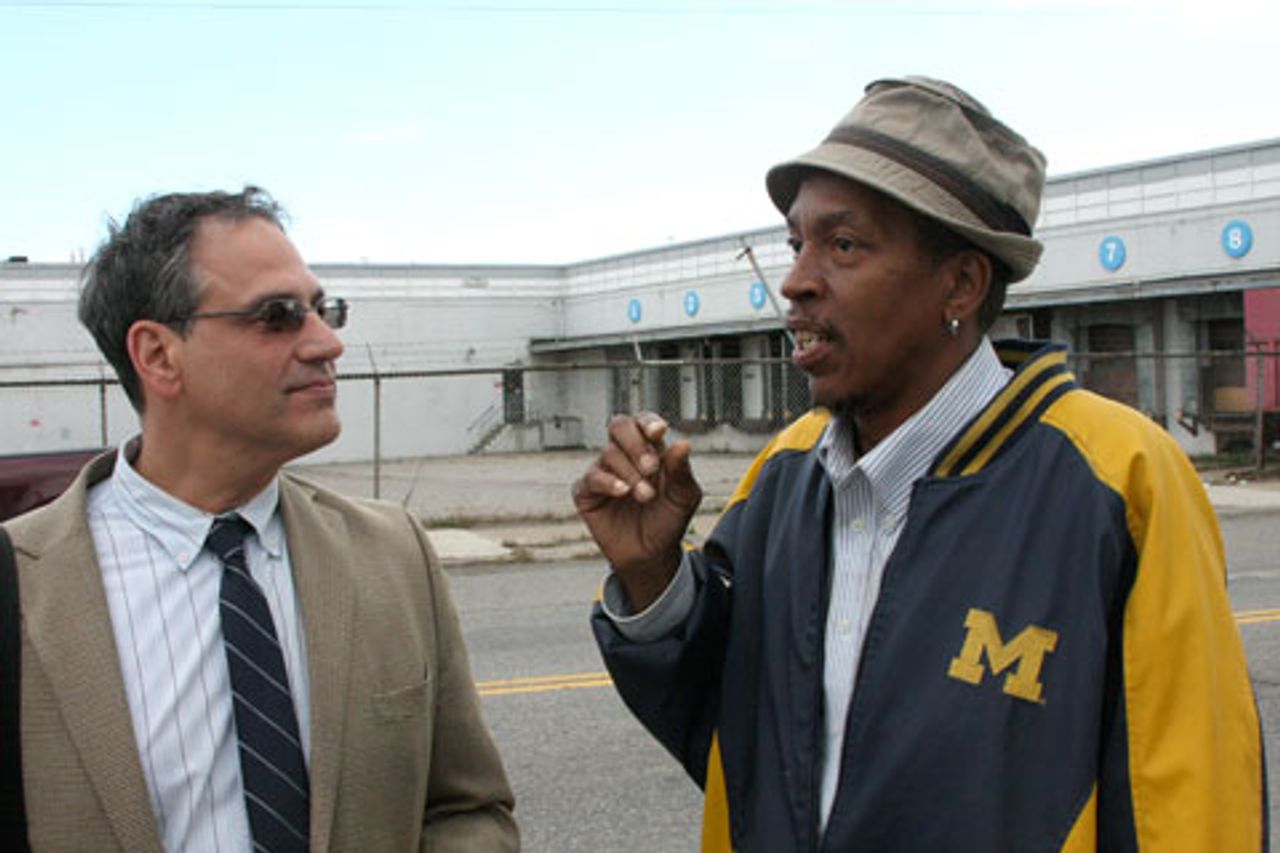The Socialist Equality Party’s candidate for US president spoke with workers at the Detroit Water and Sewerage treatment plant who walked out Sunday to oppose plans to wipe out 80 percent of their jobs, slash health care and pension benefits and privatize the profit-making department.
 White on the picket line
White on the picket lineJerry White visited the picket line on the city’s southwest side Sunday afternoon. He expressed his solidarity with the striking workers and discussed the political issues in their fight. White said the stand of the striking workers deserved the support of the entire working class. The SEP candidate was greeted warmly on the picket line, and many workers expressed interest in a socialist alternative to both big business parties.
SEP supporters distributed a statement from White that called for an extension of the strike to all city workers as part of a political counteroffensive by the working class against the corporate-government attack on jobs and living standards.
The strike, the statement said, was part of a growing movement of resistance by the working class in the US and internationally, including in Greece, Spain, South Africa and the recent Chicago teachers strike. Throughout the world, the corporate and financial elite was insisting that workers pay for the economic crisis they did not create.
White told workers their struggle placed them in a direct confrontation with the Democratic administration of Detroit Mayor David Bing, Republican Governor Rick Snyder and the Obama White House.
 White listens to a striker
White listens to a strikerEric, a veteran worker, told White, “They want to change our titles and turn skilled workers into ‘technicians,’ so instead of paying $30 an hour they can reduce us to poverty wages. The government is made up of the rich and only takes care of the rich. When it came to handing over money to the banks to get them out of debt there was no problem, but if I wanted a loan they would charge me 30 percent interest. The loan sharks are in power.”
Another worker said he was sympathetic to socialism but still believed the Democratic Party could be forced, if workers placed pressure on it, to guarantee workplace rights and decent wages.
White said that the Democrats had long abandoned any policy of social reforms and were attacking the working class just as viciously as the Republicans. This was seen in Obama’s attack on auto workers, teachers and other sections of workers. One key tactical difference, White said, was that the Democrats, in contrast to many Republicans, were more likely to use the services of the trade unions to accomplish the impoverishment of the working class.
The SEP candidate pointed to the experience of the United Auto Workers, which collaborated with the Obama administration in the 2009 auto industry bailout. “In exchange for condemning the next generation of auto workers to half the traditional wages,” White said, “the Obama administration handed the UAW billions of dollars in corporate shares of GM and Chrysler.”
The worker said he would carefully consider these issues.
William, a worker with more than a decade at the plant, said, “The city has just sold another round of municipal bonds for capital improvements at the sewerage plant. Big investors make plenty of tax-free money from the bonds.” Mayor Bing, he said, spoke for the big corporations, like DTE Energy where he served on the board of directors. “Snyder and Bing might quarrel, but they are in accord when it comes to screwing the workers. As for the unions, they have long been bought off.”
Lionel, a worker with over two decades of service, added, “They want to take away our health benefits and replace them with a substandard package. They’re also going after our pensions and want to change our titles and how much money we make.
“Outside contractors get hazardous pay for working in there, but we don’t. Our plant has one of the highest cancer rates around, and the atmosphere is so toxic that it eats through stainless steel cabinets. Can you imagine what it is doing to us? And they are telling us that we have to eat right or they’ll cut our health benefits.”
Lionel added, “The master plan is to privatize this operation—but the first thing they have to do is get rid of us. All of a sudden they are saying we need license requirements, but they don’t give us training. If we got those licenses years ago they would have to have paid us more—so they never pushed for it. They want to retitle us so they can pay $7 or $8 an hour.
“They’re already hiring workers on a lower-tier pay scale just like in the auto plants where I worked in the 1990s.”
Ricardo, a worker with 27 years, added, “This is the third strike I’ve been on since 1979. But this is a bigger fight. The big private equity firms like the Carlyle Group want to get their hands on the Detroit water system, which is tied to the Great Lakes, the biggest source of fresh water in the world. The control of water, like oil and coal before it, means power.
“The plant here used to have technology called digesters that collected the methane gas from the sewerage processing operation. The plant once ran on the electricity generated from methane and sold the surplus to DTE. The digesters were shut down, and now we have to buy electricity from DTE instead. The oxygen producing plants were also shut down, and we have to buy oxygen from private contractors. The city says Toronto was the test case for the mass layoffs and outsourcing. They made it sound like everything went perfectly there—but it ended up costing Toronto $12 billion.”
White explained that the SEP rejected the claim that there was no money to sustain essential social services and basic infrastructure or the workers that maintained them, under conditions in which trillions have been handed to Wall Street and the Pentagon war machine. He warned, however, that the unions, including the American Federation of State, County and Municipal Employees (AFSCME) and the United Auto Workers (UAW) were wedded to the Democrats and accepted the entire framework of the capitalist system.
White urged workers to form rank-and-file committees to take the conduct of the strike out of the hands of the unions and fight to unite all workers throughout Metro Detroit in a common struggle. The provision of water and other essential services could no longer be held hostage to the profit interests of the financial aristocracy, but had to be guaranteed to all by transforming the banks and basic industry into democratically controlled public enterprises.
Subscribe to the IWA-RFC Newsletter
Get email updates on workers’ struggles and a global perspective from the International Workers Alliance of Rank-and-File Committees.
